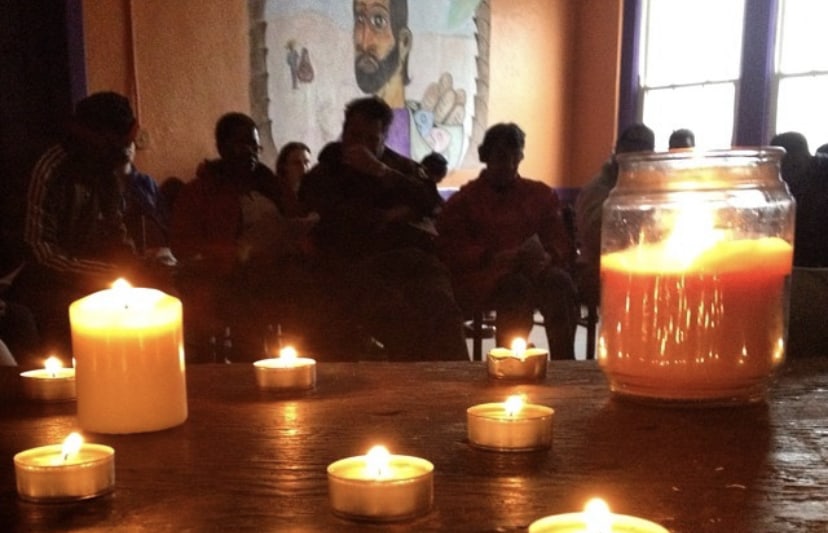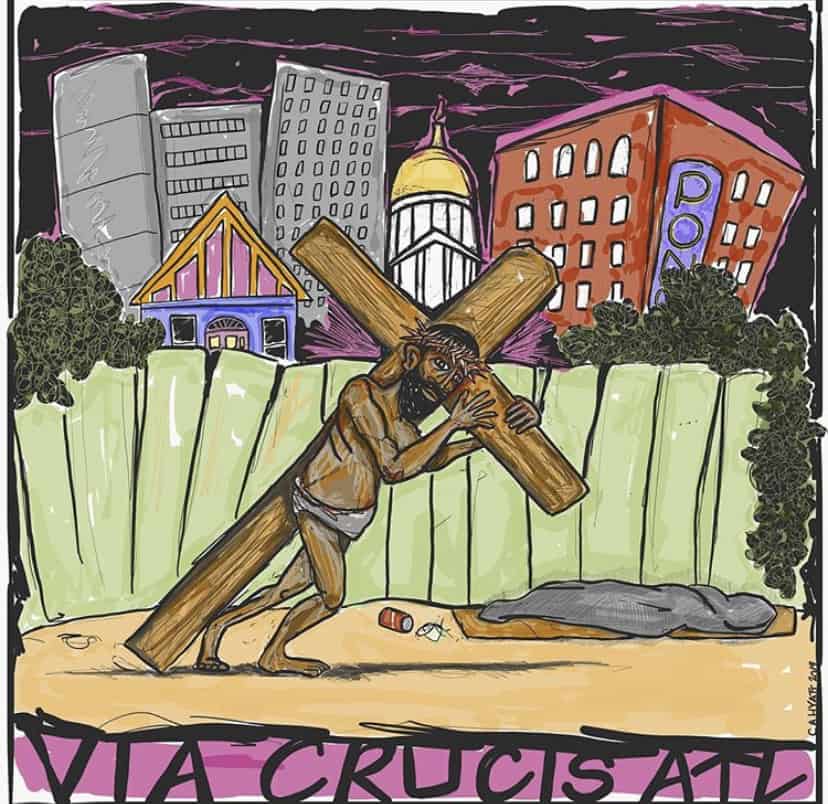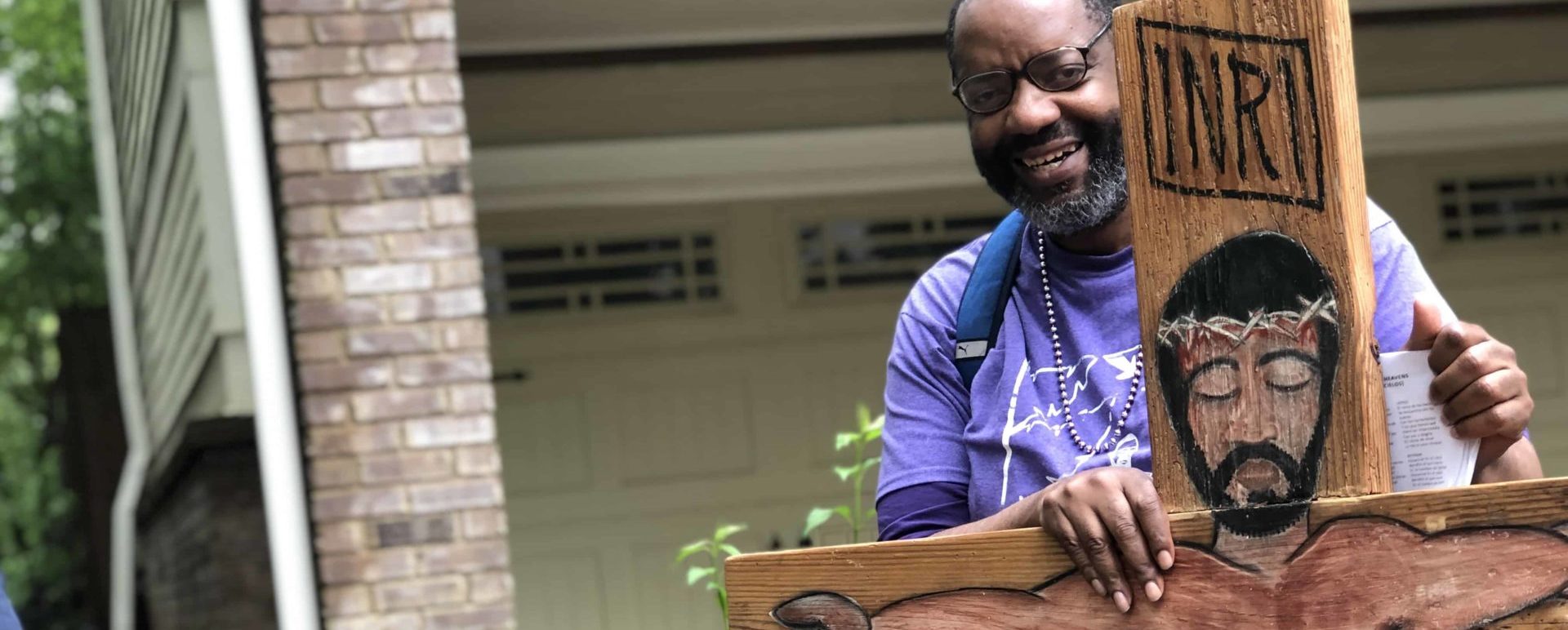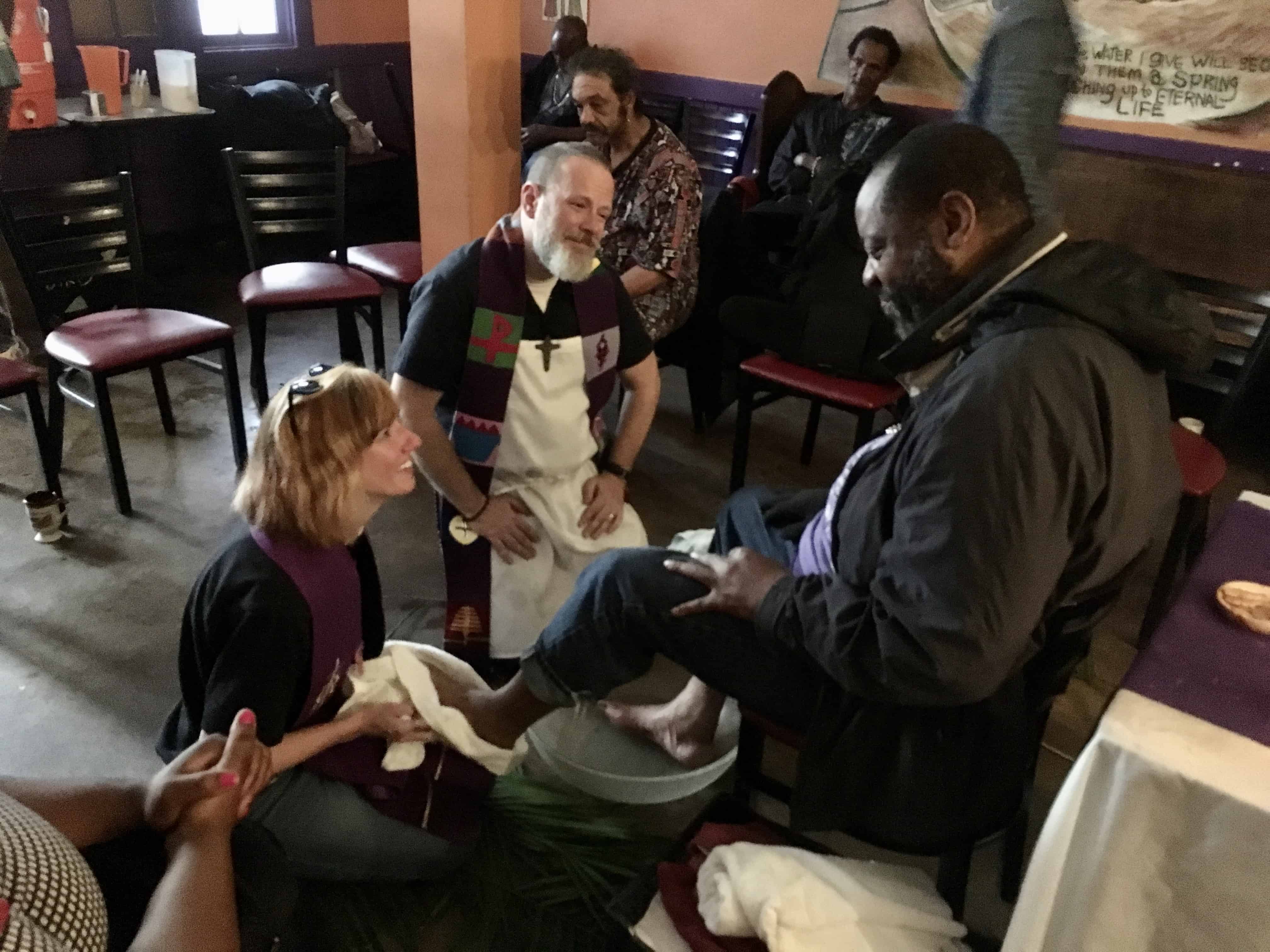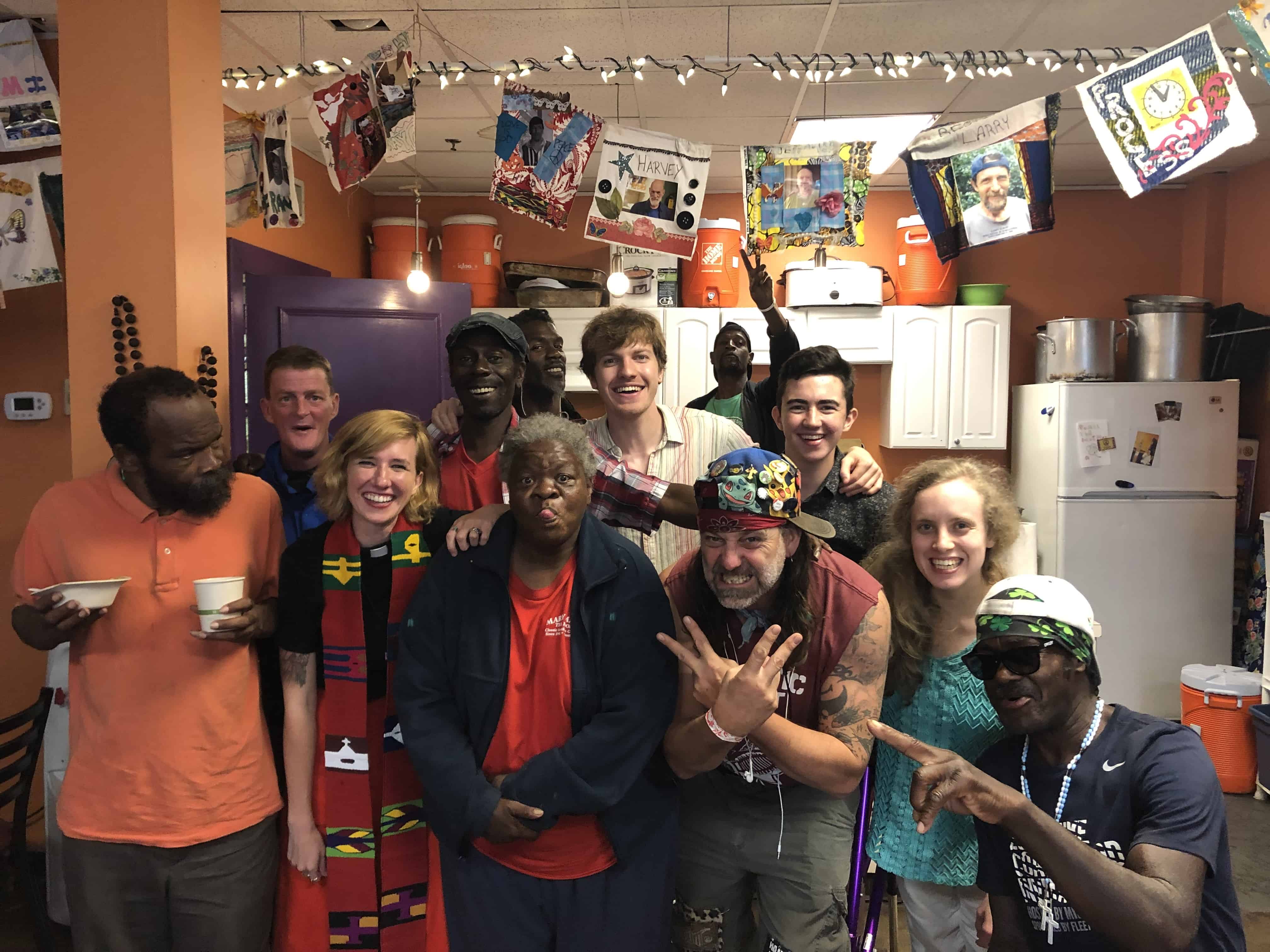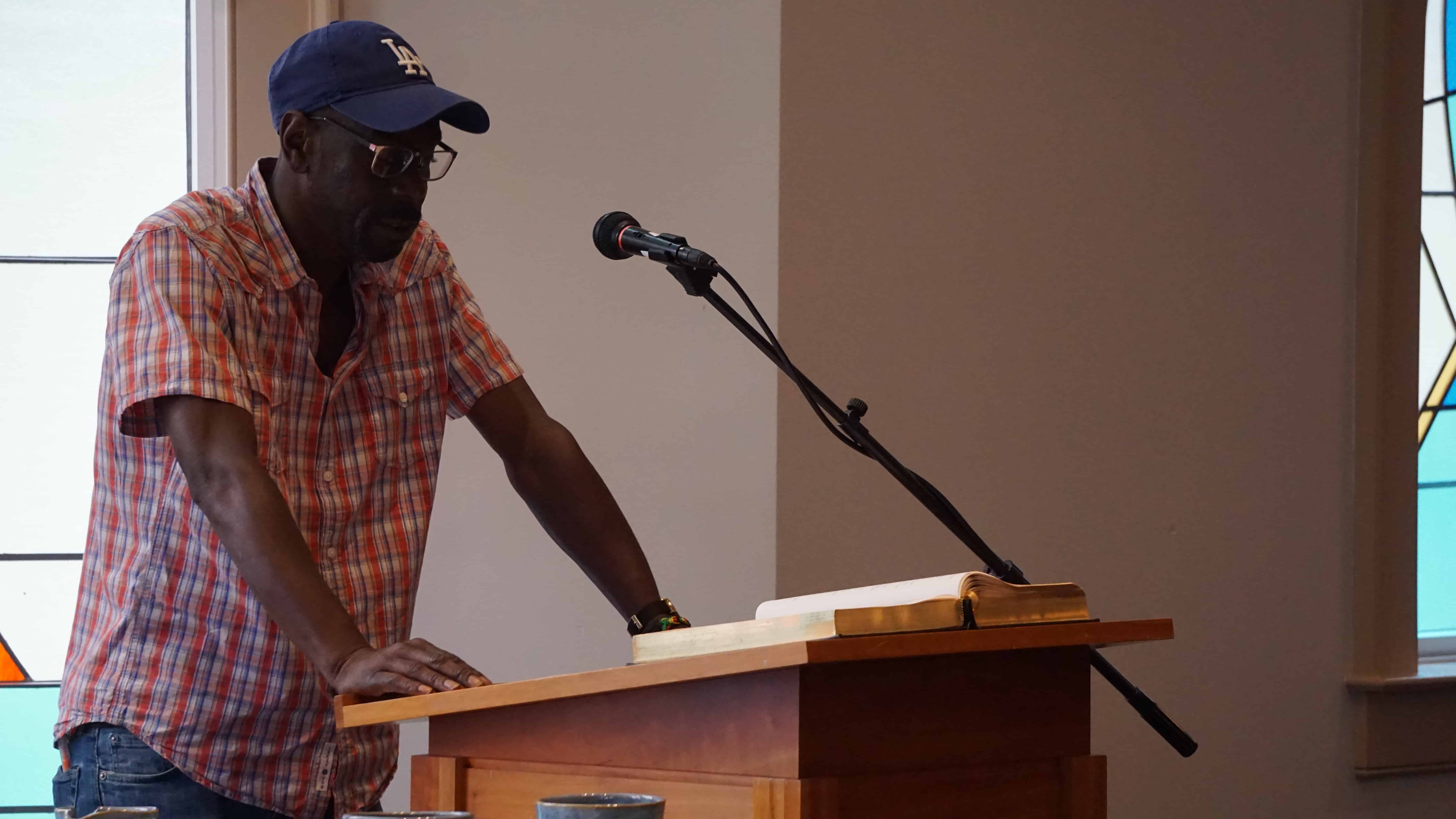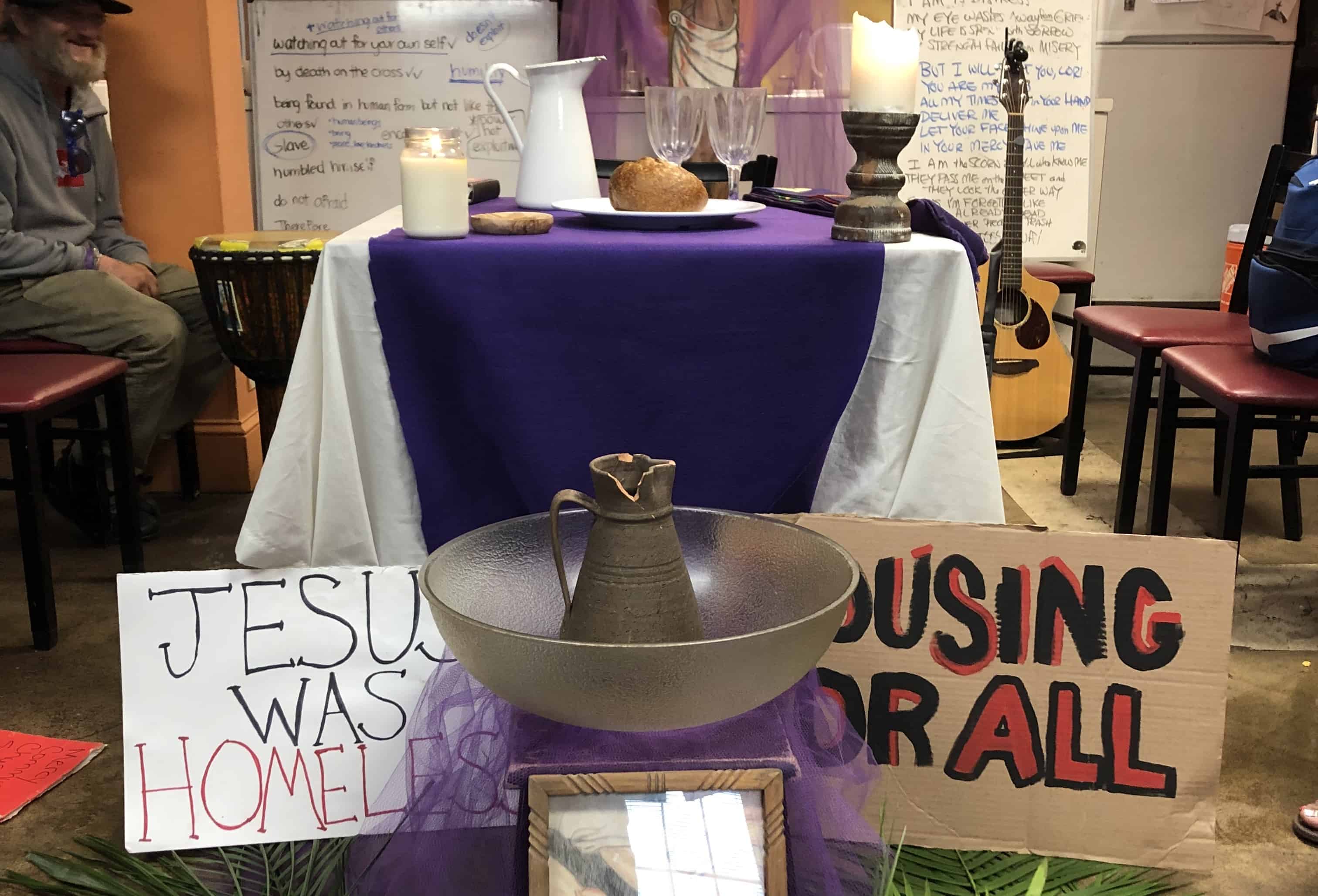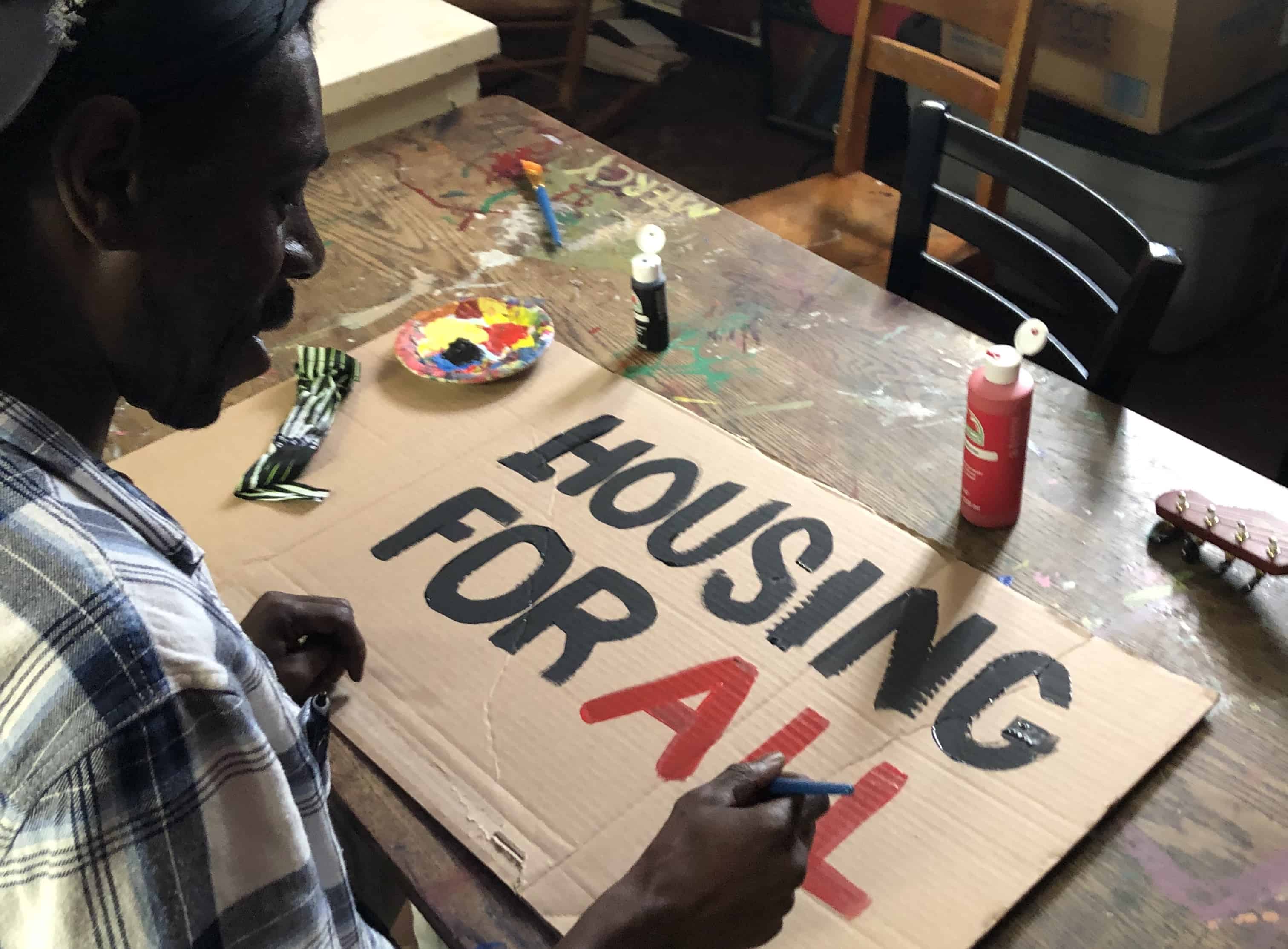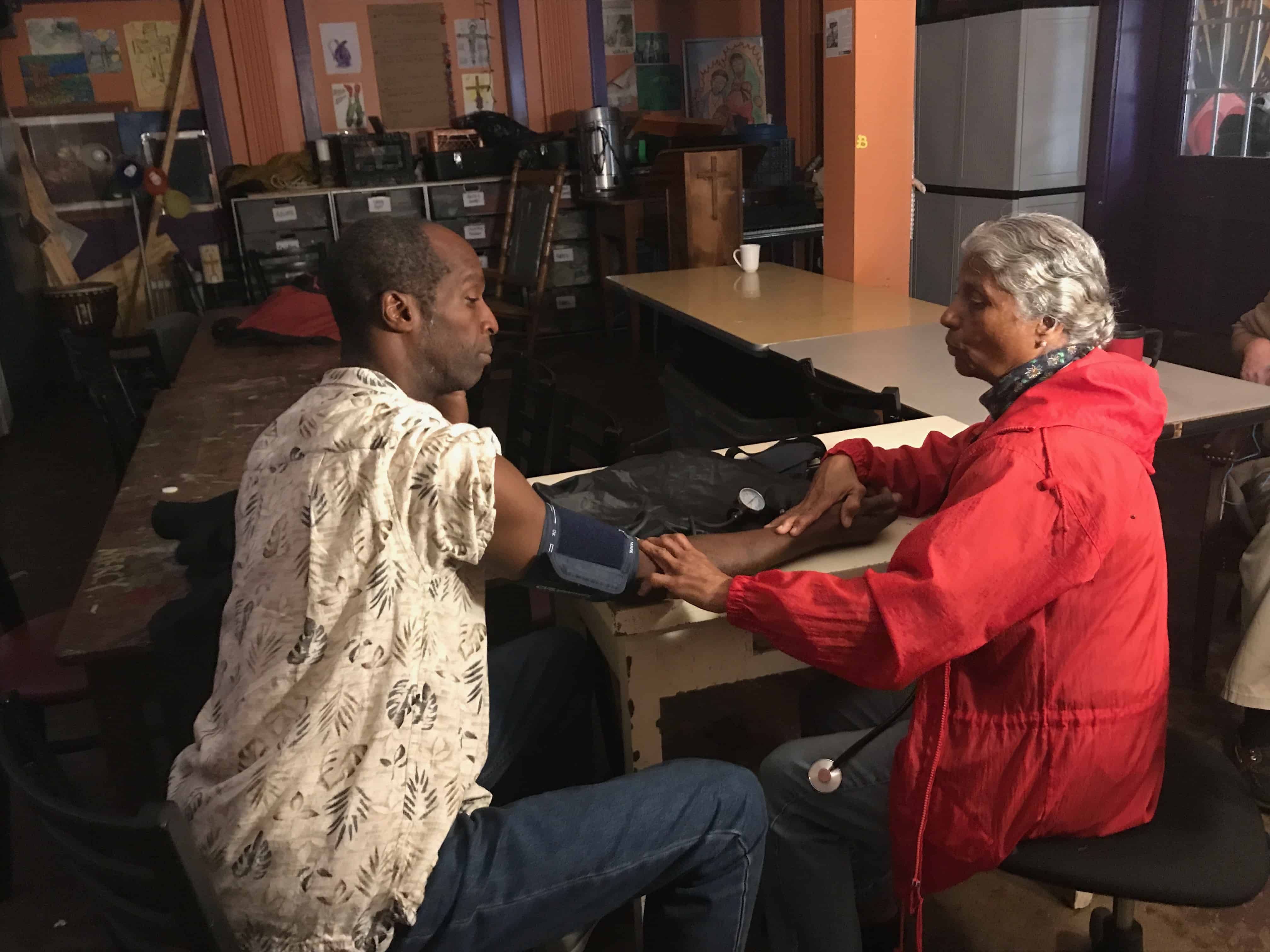By: Holly Reimer
Matthew 27:57-66
Reflection—v. 61 ‘Mary Magdalene and the other Mary were there, sitting opposite the tomb.’
They sit and wait. I don’t know about you, but I am not a patient person. I HATE waiting and as a result am in constant motion. But there is nothing to do on Holy Saturday but wait. We can remember the promises we have been told by Jesus himself, trusting in who he is, waiting for him to return, but we still must wait. And so we wait in our sadness, in moments of despair–waiting. Outside of pastoring at Mercy, I spend my extra time in the hospital serving as a chaplain to those who have lost loved ones. This is the very image that comes to mind – family members and friends sitting at the bedside. The loved one has passed, all efforts for revival have been attempted and it is finished–so they sit, paralyzed by sadness. Parents wait until the very last moment with their dead child. And so we also sit with one another in our community. We sit and wait for test results in the hospital. We sit opposite one another when a beloved member expresses feeling lost, distanced or even oppressed at the hands of God. We sit. In the pain and grief there is often nothing we can do to ‘fix’ the things that afflict, but being present in that very moment is valuable. In moments like these, we sit in the darkness and we wait. There is no pressure to move forward.
Prayer O Lord, we sit and wait for you. Let us be faithful as you have and forever will be.
Good Friday Urban Stations of the Cross Digital Service
Blessed Good Friday, community. Today is usually a day that our community gathers to take to the streets and worship together with song, prayer, and the breaking of bread. While we cannot be together this year, we hope you’ll enjoy this digital version of our Urban Stations of the Cross service. It includes meditations, songs, prayers, images of our vibrant community, and a video message from Pastor Holly.
As a part of your Good Friday reflection today we hope you’ll read and listen along, holding us in prayer.
Here is a link that will allow you to view the service online
Here is a downloadable PDF version
Good Friday, April 10th
By: Holly Reimer
Isaiah 52:13-53:12
Reflection—v. 3 ‘He was despised and rejected by others; a man of suffering and acquainted with infirmity’
This is probably one of my favorite days of Holy Week because it honors the suffering that Jesus experienced as well as the pain that we also experience. Pain and suffering are real. Jesus experienced the physical and emotional vulnerabilities associated with being human. His body was susceptible to thirst on the cross, and he felt the pain of sharp objects piercing his flesh. Jesus also experienced the hurt of being rejected by folks who never really saw him as valuable. His disciples fell asleep on him and denied him as he was being questioned by the authorities. He died the dehumanizing death of a criminal. We too feel alone, isolated, and rejected throughout our lives and in moments and seasons of suffering. In our pain we ask questions similar to the Pharisees and High Priests, ‘Why would you let this happen God?’ As this passage intimates, suffering isn’t simply a physical loss–it can be when we feel alone and isolated, it is when we’re struggling with the loss or changing of relationships, it can be a change in our health and the realization that we don’t have what we need in order to recover. It can be heartbreaking, and that is okay. Let us not feel like we must move too quickly from Good Friday to Easter Sunday, because the pain is real.
Prayer Lord, may we find space for suffering and companions willing to journey with us.
Maundy Thursday, April 9th
By: Brittany Fiscus-van Rossum
John 13: 1-17, 31b-35
Reflection—v. 15 ‘For I have set you an example, that you also should do as I have done to you.’
At Mercy, every Maundy Thursday we hold a foot washing service. Surprisingly, though I had been a part of the community for some years, I had never attended one of these services until my first year as a pastor to the church. The reaction I had to the experience of washing the feet of my community members was a bit overwhelming. Pastor Chad and I took turns washing each person’s feet, all the while gently speaking to them affirmations of their sacred belovedness and value to the community. Tears of gratitude pooled in my eyes and streaked down my cheeks as the water ran through my fingers and I thought about how blessed I was to know each person–how thankful I was that this community had trusted me with the responsibility of being their pastor. After everyone who desired to participate had their feet washed and dried someone from the community volunteered to wash mine. I remember how calming it felt as they toweled my feet, whispering back affirmations for me too. In that simple yet intimate moment I believed the truth of my belovedness. God came to be with us as a human being, an embodied example of the truest love. If ever we forget the truth of God’s great love for each and every one of us, all we must do is look to this example and do as the Christ we follow does—we humbly and graciously care for, serve, and love one another, and let ourselves be cared for, served, and loved in return.
Prayer Servant Lord, whenever we doubt our belovedness or the value of others, may we look to your example.
Wednesday, April 8th
By: Brittany Fiscus-van Rossum
Isaiah 50:4-9a
Reflection—v. 7 ‘I know that I shall not be put to shame’
Shame is something we talk about a lot in our community. While it often seems that healthy foods, affordable housing, and adequate healthcare are scarce, shame comes in abundance out here on the streets. Homelessness, joblessness, mental health, severed relationships, poverty, addiction—they can all carry shame, and the false narratives our society spews only serve to bolster the case that we are failing or that we’ve done something wrong, when really there are larger more systematic problems at play here. Shame can keep us from seeking wellness for ourselves or from forming healthy community. Shame can even keep some of us from learning and growing when we become immobile with fear, not wanting to say or do the ‘wrong’ thing. My firm belief is that God desires to set us free from such shame. When we study scripture together as a community at Mercy, we remind ourselves of this liberating truth. We remind ourselves that though the world may spit at us, strike us, and insult us, God will not put us to shame. God created us, loves us, and desires for us life and well-being, and not the shame that inhibits our thriving. In our community we have a variety of ways of proclaiming how our relationship with God is ‘mess-up safe,’ so there’s no shame. In the moments that I find myself carting around my shame like an unwanted carry-on, I’m thankful for a community that reminds me that my relationship with God, and with them, is safe.
Prayer Loving God, set us free from the shame that inhibits our thriving in community.
Tuesday, April 7th
By: Ivan Cooley
Isaiah 50:4-9a
Reflection—v. 7 ‘I know that I shall not be put to shame’
I want to be proactive about seeing my family. I chose to give up being around my family because I felt like I was bringing shame to them, and I felt like I wasn’t going to change anytime soon. I would like to say that my decision was some kind of noble decision, but it wasn’t. It was a decision that was made out of shame and guilt. Believe me, I’ve felt the ramifications of that. Even though in a sense you could say I gave up on them, they never gave up on me. Even in my worst times my father would write me letters and tell me ‘Son, you’re smart. You’re going to make it. We love you. The door’s always open.’ You see, that’s the way God is too. And if God hadn’t left his door open for me, then I wouldn’t be in the process of trying to see my parents again. I haven’t given up my parents. As much as it doesn’t look like it, I do love them. I don’t just want to satisfy my own needs and alleviate my own shame and guilt–it’s something that I want for them too. I want to see my father and mother smile. I want to reunite with my family, because, you see, that’s what we all are in this whole world–one big family. It’s my wish and my prayer that everybody can reunite with their loved ones. God did the ultimate–God looked at humankind as his family. Even when we stray away, and maybe not pray or even think about God for a little while, let us not forget that we are a member of God’s family.
Prayer: God our parent, when we feel alone, help us to remember we are yours.
Monday, April 6th
By: Ivan Cooley
Matthew 21:1-11
Reflection—v. 9 ‘Blessed is the one who comes in the name of the Lord.’
When the people saw the king coming, they spread cloaks on the ground and broke off palm branches and laid them on the ground. They also waved the palm branches in the air to symbolize victory. The people were greeting the king in homage and shouted Hosanna. Hosanna is another way of saying savior, rescue me, or save me. On the king’s advent into town there was bedlam. The whole city was asking “who is this?” This is the prophet Jesus from Nazareth in Galilee. That my friends, is the only humanitarian king I can think of. He lived a sinless life. He gave his sinless, blemish free life, so that we can be forgiven. He lived his life with love for humankind. A living, breathing human example of what we should strive for in our spiritual lives. I can tell people a king died so that I can live. In this way he conquered sin. He rose from the dead conquering sine and death. He demanded nothing and compassionately asked us to remember, follow, and believe in him. I certainly do, unquestionably. I wasn’t alarmed because the youth pastors and the youth group knew the same thing I knew. He is the only king worthy to be worshiped in prayer, and it sure is not a human one unless his name is Jesus Christ for he is truly the King of Kings—he has the victory over the enemies of our soul. He wants to see us all flourish like a palm tree in victory.
Prayer Hosanna, Blessed is the one who comes in the name of the Lord. Hosanna in the highest!
Palm Sunday, April 5th
By: Ivan Cooley
Matthew 21:1-11
Reflection—v. 5 ‘Look, your king is coming to you, humble’
A youth group attended Mercy one day. I was asked to pray at the conclusion of the phenomenal time we had spent together. I ended the prayer with the words “All praise and glory and honor to our King” then I hesitated. In two seconds of hesitation, closed eyes opened, bowed heads raised, trusting eyes became dubious gazes. When I clarified myself by naming Jesus Christ, happiness and good cheer were restored. I found no reason to be alarmed. In all my discussions concerning emperors and kings, about the only thing that can be said that’s satisfactory about them is that some may have been refined in the art of war. In other words, they are excellent at disturbing the peace and balance of humankind through violence and oppression. Real quick! Name one czar, emperor, or king who is remembered for being a humanitarian. I can name only one. He lived roughly two thousand years ago. He traveled all through the land preparing people for life not death. He preached, he taught, he blessed, he healed, he fed, and he clothed- -and these acts were considered miracles. The people of Israel were eagerly awaiting their king. The one who would free them from tyranny and oppression from the Roman Empire. He told two of his lieutenants to go into the village and find him a donkey. The donkey symbolizes serving, suffering, peace, and humility. The king lived his life serving and suffering with the peace and humility of a man who knew his destiny. Befitting a king, the lieutenants covered the donkey with their cloaks. When the King arrived in town, prophecy was fulfilled. “Look, your king is coming to you humble and mounted on a donkey.”
Saturday, April 4th
By: James King
Psalm 130
Reflection—v.1 ‘out of the depth I cry to you, O Lord’
In Psalm 130 it sounds like the people are asking for forgiveness for all the wrong-doings that they’ve done, and they’re waiting on the Lord to answer their prayer. The people have been living their life in sin, and now it’s catching up with them. Now they’re asking the Lord for forgiveness. They’re hoping and they’re looking for him, and they’re just waiting and waiting for the Lord to answer their prayer because they want to change the way they live. That is what the psalmist is saying: ‘Lord, forgive me for all my sins, and help me to change the way I’m living, and give me a new beginning. I put my hope in you, and I’ll keep my hope in you until you answer my prayers.’ Only the Lord can do that. Sometimes I feel like this too. I feel this way all the time. Sometimes it weighs heavy on me. Sometimes I think about it at night when I’m trying to sleep, and it’ll all be on my mind. ‘Why do I live like this? I don’t have to live like this. Why don’t I just change the way I live?’ It seems like I’m helpless. Sometimes it weighs heavy on me and it hurts. The writer of psalm 130 is like me, asking for forgiveness, asking God to take me from all of this madness and change the way I live.
Prayer Lord, forgive us for all our sins, and help us to change the ways we’re living, and give us new beginnings. We put our hope in you, and we’ll keep our hope in you until you answer our prayers.
Tuesday, March 24th
By: Brittany Fiscus-van Rossum
Ephesians 5:8-14
Reflection—v. 11 ‘expose them’
Listening to the news about our country’s current state of affairs can be a practice in self-inflicted misery—it’s disheartening. Is there no one above corruption? Is there anyone willing to listen with reason and compassion? As I listen, I wind myself up with self-righteousness that quickly turns to resentment and despair. I want people to see what seems too clear to me! I want these crooked politicians and all their broken systems to be exposed! But then there are also these other times, when I myself know there are things I would rather conceal—all the ways that I am selfish, the many instances when I have benefited from privilege, the mistakes I’ve made, the times when I’ve said the wrong or hurtful thing. I don’t want anyone to know these things about me, lest they know that I’m imperfect too. On my healthiest of days, I know in my heart that none of us are perfect. The more willing I am to expose my own short-comings instead of squirreling them away in shame, the better I am able to mature and be transformed by the loving truth that I am complicit and sinful, that I have things to work on, but I am also beloved. Walking into the light, letting yourself be exposed for who you truly are (simultaneously beloved and broken), can be a bit of a painful process, but I believe it leads to wholeness, health, and a loving truthfulness we too often neglect. I pray for our leaders, and all of us who hold power, to be so exposed, that it may bring life, truth, and well-being for us all.
Prayer Healing spirit, descend upon us to bring light and truth and life!

